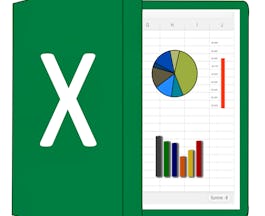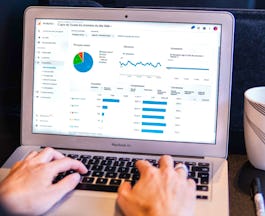Filter by
The language used throughout the course, in both instruction and assessments.
Choose the Excel Macros Course That Aligns Best With Your Educational Goals

University of Colorado Boulder
Skills you'll gain: Spreadsheet Software, Computer Programming, Problem Solving, Microsoft Excel, Programming Principles, Data Analysis, Critical Thinking, Algorithms, Computer Programming Tools, Computational Logic, Computational Thinking
 Status: Free
Status: FreeJohns Hopkins University
Skills you'll gain: Business Analysis, Data Analysis, Data Visualization, Spreadsheet Software, Data Model, Decision Making, Microsoft Excel, Process Analysis, Statistical Visualization

Coursera Project Network
Skills you'll gain: Data Analysis, Data Mining, Microsoft Excel

Coursera Project Network
Skills you'll gain: Data Analysis, Microsoft Excel

University of Colorado Boulder
Skills you'll gain: Microsoft Excel, Spreadsheet Software, Computer Programming, Programming Principles, Critical Thinking, Data Analysis, Problem Solving, Computer Programming Tools, Computational Logic, Computational Thinking

Macquarie University
Skills you'll gain: Spreadsheet Software, Business Analysis, Microsoft Excel, Data Analysis, Plot (Graphics), Data Visualization, Data Model, Databases, Finance, Leadership and Management

Coursera Project Network
Skills you'll gain: Data Analysis, Microsoft Excel, Data Management, Leadership and Management

University of Colorado Boulder
Skills you'll gain: Microsoft Excel, Data Analysis, Spreadsheet Software, Business Analysis, Data Analysis Software, Data Management, Critical Thinking, Problem Solving, Mathematics, Data Visualization, Computer Programming Tools, Finance, Market Analysis, Regression

Coursera Project Network
Skills you'll gain: Data Analysis, Microsoft Excel

Microsoft
Skills you'll gain: Data Analysis, Data Management, Data Mining, Data Model, Data Visualization, Extract, Transform, Load, Microsoft Excel, Power BI, SQL

Macquarie University
Skills you'll gain: Business Analysis, Spreadsheet Software, Data Analysis, Data Analysis Software, Data Management, Data Visualization, Microsoft Excel, Exploratory Data Analysis, Data Model, Data Structures, Database Design, Interactive Data Visualization, Interactive Design, Plot (Graphics), Big Data, Power BI
 Status: Free
Status: FreeKnowledge Accelerators
Skills you'll gain: Data Analysis, Data Model, Data Visualization, Microsoft Excel, Power BI
Searches related to excel macros
In summary, here are 10 of our most popular excel macros courses
- Excel/VBA for Creative Problem Solving: University of Colorado Boulder
- Business Analytics with Excel: Elementary to Advanced: Johns Hopkins University
- Introduction to Data Analysis using Microsoft Excel: Coursera Project Network
- Create Charts and Dashboards Using Microsoft Excel: Coursera Project Network
- Excel/VBA for Creative Problem Solving, Part 1: University of Colorado Boulder
- Excel Skills for Business: Macquarie University
- Introduction to Microsoft Excel: Coursera Project Network
- Everyday Excel: University of Colorado Boulder
- Using Basic Formulas and Functions in Microsoft Excel: Coursera Project Network
- Microsoft Power BI Data Analyst: Microsoft










